Research Proposal Methodology for Mental Health Study
VerifiedAdded on 2022/09/12
|12
|3013
|34
Report
AI Summary
This research methodology report outlines the approach for a study investigating the impact of the Mediterranean diet on the mental health status of individuals diagnosed with depression. Employing a positivism philosophy, the study utilizes a quantitative, survey-based research design, involving a randomized sampling method to recruit participants from mental health day hospitals. Data collection includes educational and cooking sessions, food hampers, and fortnightly feedback sessions over a four-month period. Data will be collected at baseline, 2 months, and 4 months using the Beck Depression Inventory (BDI) and the Mediterranean Diet and Assessment of Quality of Life (AQoL)-8D surveys. Ethical considerations, including informed consent and data privacy, are addressed. Data analysis will be performed using SPSS, and the findings will be disseminated through publications and online resources. The study aims to provide insights into the relationship between the Mediterranean diet and improved mental health, with implications for nursing practice and future research.
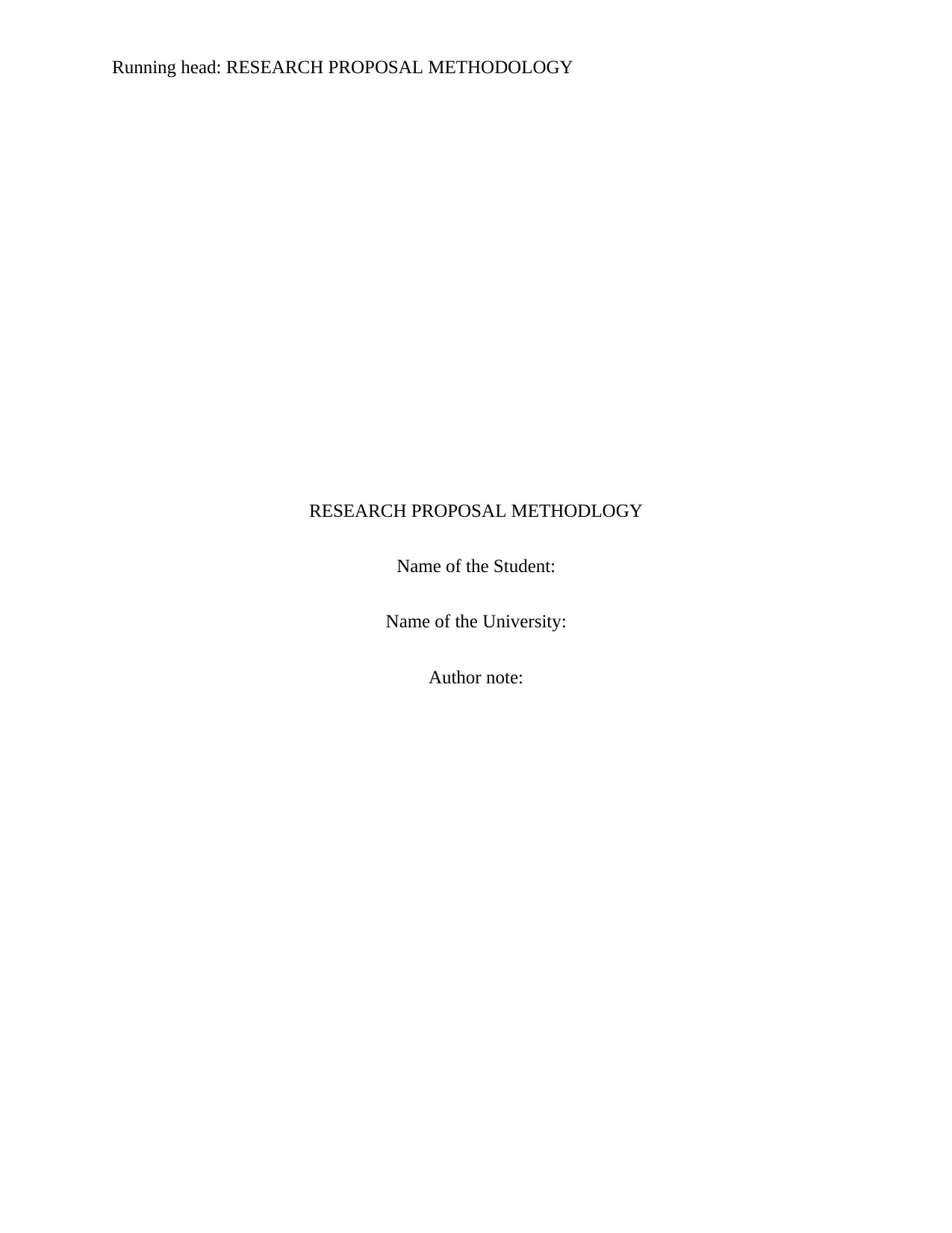
Running head: RESEARCH PROPOSAL METHODOLOGY
RESEARCH PROPOSAL METHODLOGY
Name of the Student:
Name of the University:
Author note:
RESEARCH PROPOSAL METHODLOGY
Name of the Student:
Name of the University:
Author note:
Paraphrase This Document
Need a fresh take? Get an instant paraphrase of this document with our AI Paraphraser
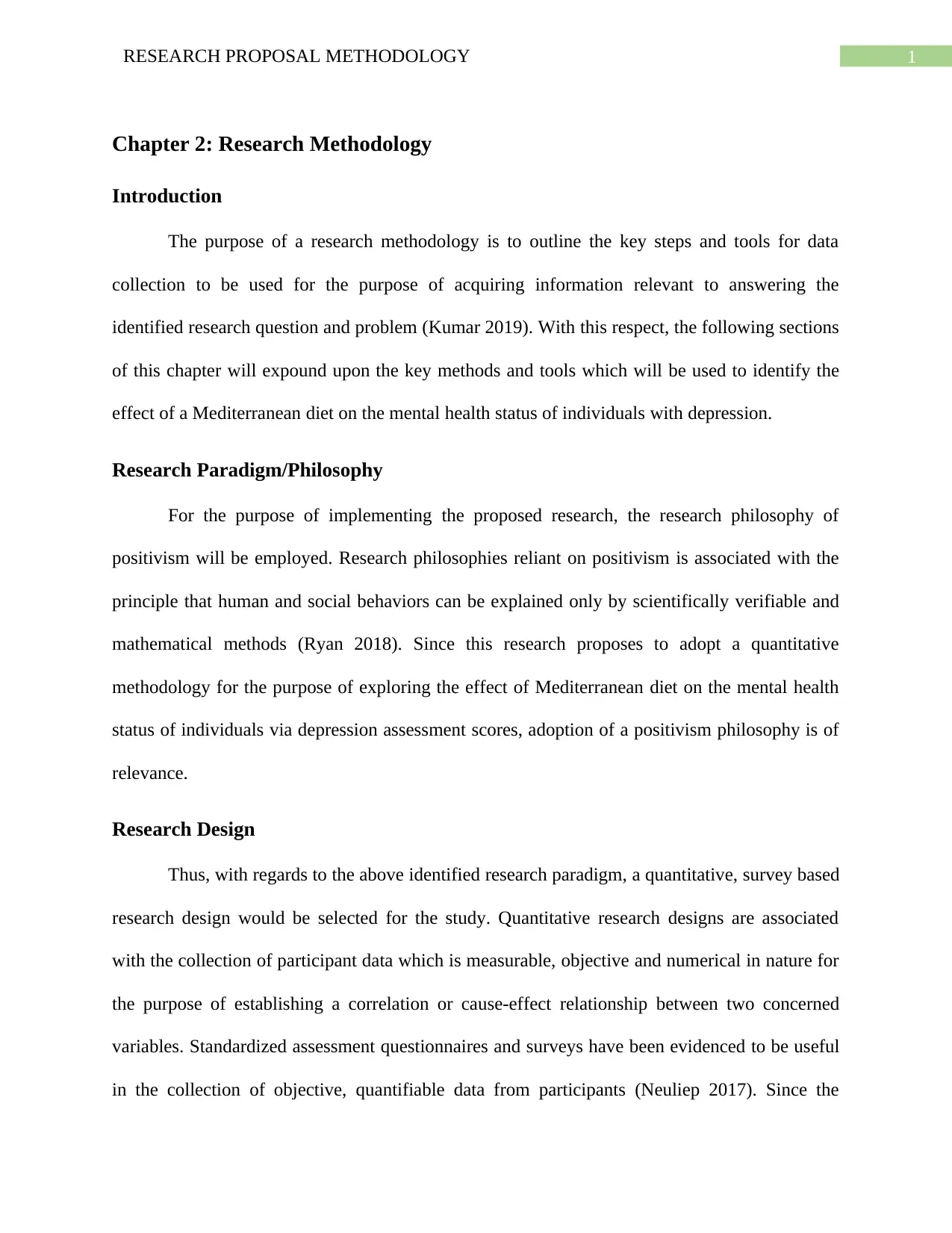
1RESEARCH PROPOSAL METHODOLOGY
Chapter 2: Research Methodology
Introduction
The purpose of a research methodology is to outline the key steps and tools for data
collection to be used for the purpose of acquiring information relevant to answering the
identified research question and problem (Kumar 2019). With this respect, the following sections
of this chapter will expound upon the key methods and tools which will be used to identify the
effect of a Mediterranean diet on the mental health status of individuals with depression.
Research Paradigm/Philosophy
For the purpose of implementing the proposed research, the research philosophy of
positivism will be employed. Research philosophies reliant on positivism is associated with the
principle that human and social behaviors can be explained only by scientifically verifiable and
mathematical methods (Ryan 2018). Since this research proposes to adopt a quantitative
methodology for the purpose of exploring the effect of Mediterranean diet on the mental health
status of individuals via depression assessment scores, adoption of a positivism philosophy is of
relevance.
Research Design
Thus, with regards to the above identified research paradigm, a quantitative, survey based
research design would be selected for the study. Quantitative research designs are associated
with the collection of participant data which is measurable, objective and numerical in nature for
the purpose of establishing a correlation or cause-effect relationship between two concerned
variables. Standardized assessment questionnaires and surveys have been evidenced to be useful
in the collection of objective, quantifiable data from participants (Neuliep 2017). Since the
Chapter 2: Research Methodology
Introduction
The purpose of a research methodology is to outline the key steps and tools for data
collection to be used for the purpose of acquiring information relevant to answering the
identified research question and problem (Kumar 2019). With this respect, the following sections
of this chapter will expound upon the key methods and tools which will be used to identify the
effect of a Mediterranean diet on the mental health status of individuals with depression.
Research Paradigm/Philosophy
For the purpose of implementing the proposed research, the research philosophy of
positivism will be employed. Research philosophies reliant on positivism is associated with the
principle that human and social behaviors can be explained only by scientifically verifiable and
mathematical methods (Ryan 2018). Since this research proposes to adopt a quantitative
methodology for the purpose of exploring the effect of Mediterranean diet on the mental health
status of individuals via depression assessment scores, adoption of a positivism philosophy is of
relevance.
Research Design
Thus, with regards to the above identified research paradigm, a quantitative, survey based
research design would be selected for the study. Quantitative research designs are associated
with the collection of participant data which is measurable, objective and numerical in nature for
the purpose of establishing a correlation or cause-effect relationship between two concerned
variables. Standardized assessment questionnaires and surveys have been evidenced to be useful
in the collection of objective, quantifiable data from participants (Neuliep 2017). Since the
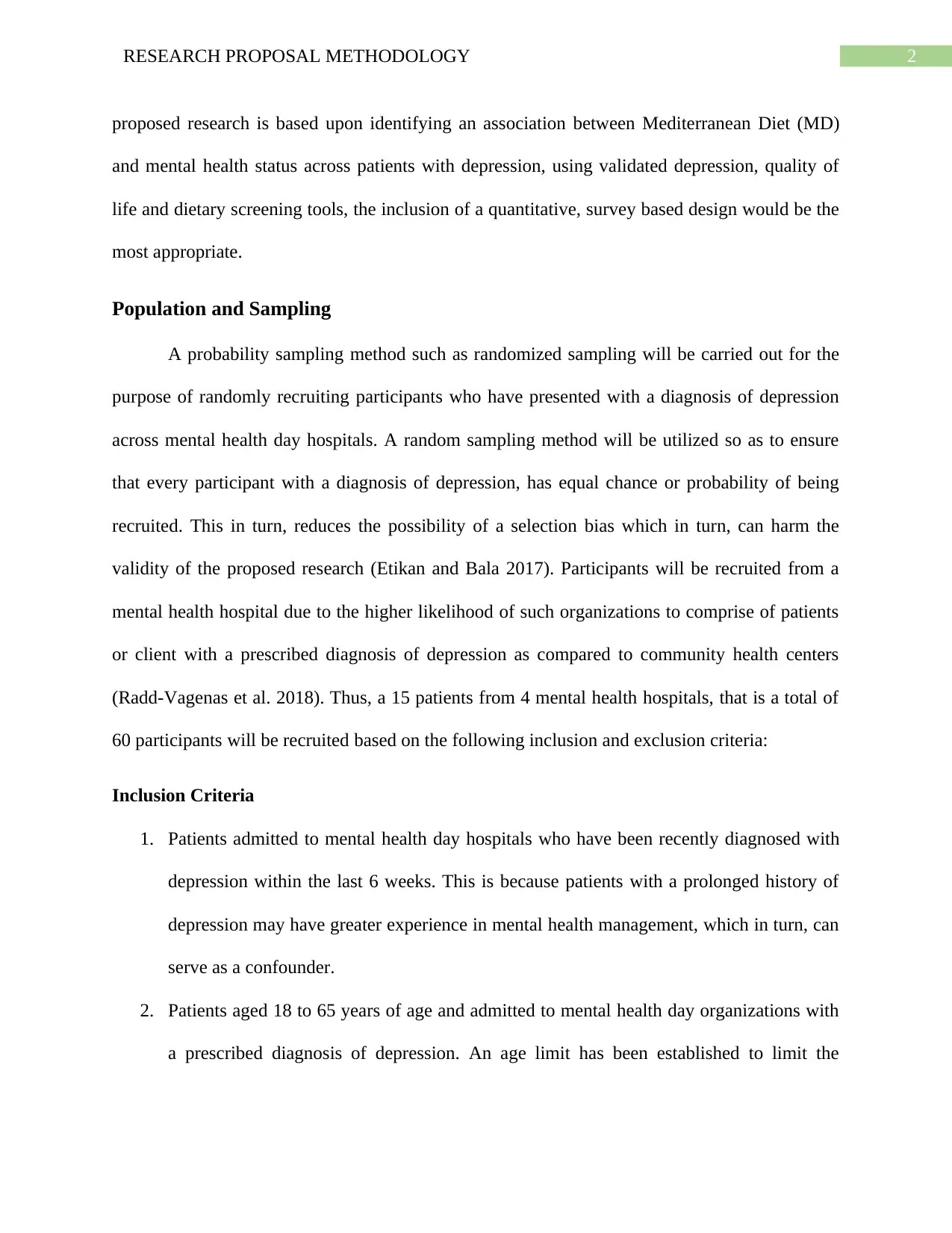
2RESEARCH PROPOSAL METHODOLOGY
proposed research is based upon identifying an association between Mediterranean Diet (MD)
and mental health status across patients with depression, using validated depression, quality of
life and dietary screening tools, the inclusion of a quantitative, survey based design would be the
most appropriate.
Population and Sampling
A probability sampling method such as randomized sampling will be carried out for the
purpose of randomly recruiting participants who have presented with a diagnosis of depression
across mental health day hospitals. A random sampling method will be utilized so as to ensure
that every participant with a diagnosis of depression, has equal chance or probability of being
recruited. This in turn, reduces the possibility of a selection bias which in turn, can harm the
validity of the proposed research (Etikan and Bala 2017). Participants will be recruited from a
mental health hospital due to the higher likelihood of such organizations to comprise of patients
or client with a prescribed diagnosis of depression as compared to community health centers
(Radd-Vagenas et al. 2018). Thus, a 15 patients from 4 mental health hospitals, that is a total of
60 participants will be recruited based on the following inclusion and exclusion criteria:
Inclusion Criteria
1. Patients admitted to mental health day hospitals who have been recently diagnosed with
depression within the last 6 weeks. This is because patients with a prolonged history of
depression may have greater experience in mental health management, which in turn, can
serve as a confounder.
2. Patients aged 18 to 65 years of age and admitted to mental health day organizations with
a prescribed diagnosis of depression. An age limit has been established to limit the
proposed research is based upon identifying an association between Mediterranean Diet (MD)
and mental health status across patients with depression, using validated depression, quality of
life and dietary screening tools, the inclusion of a quantitative, survey based design would be the
most appropriate.
Population and Sampling
A probability sampling method such as randomized sampling will be carried out for the
purpose of randomly recruiting participants who have presented with a diagnosis of depression
across mental health day hospitals. A random sampling method will be utilized so as to ensure
that every participant with a diagnosis of depression, has equal chance or probability of being
recruited. This in turn, reduces the possibility of a selection bias which in turn, can harm the
validity of the proposed research (Etikan and Bala 2017). Participants will be recruited from a
mental health hospital due to the higher likelihood of such organizations to comprise of patients
or client with a prescribed diagnosis of depression as compared to community health centers
(Radd-Vagenas et al. 2018). Thus, a 15 patients from 4 mental health hospitals, that is a total of
60 participants will be recruited based on the following inclusion and exclusion criteria:
Inclusion Criteria
1. Patients admitted to mental health day hospitals who have been recently diagnosed with
depression within the last 6 weeks. This is because patients with a prolonged history of
depression may have greater experience in mental health management, which in turn, can
serve as a confounder.
2. Patients aged 18 to 65 years of age and admitted to mental health day organizations with
a prescribed diagnosis of depression. An age limit has been established to limit the
⊘ This is a preview!⊘
Do you want full access?
Subscribe today to unlock all pages.

Trusted by 1+ million students worldwide
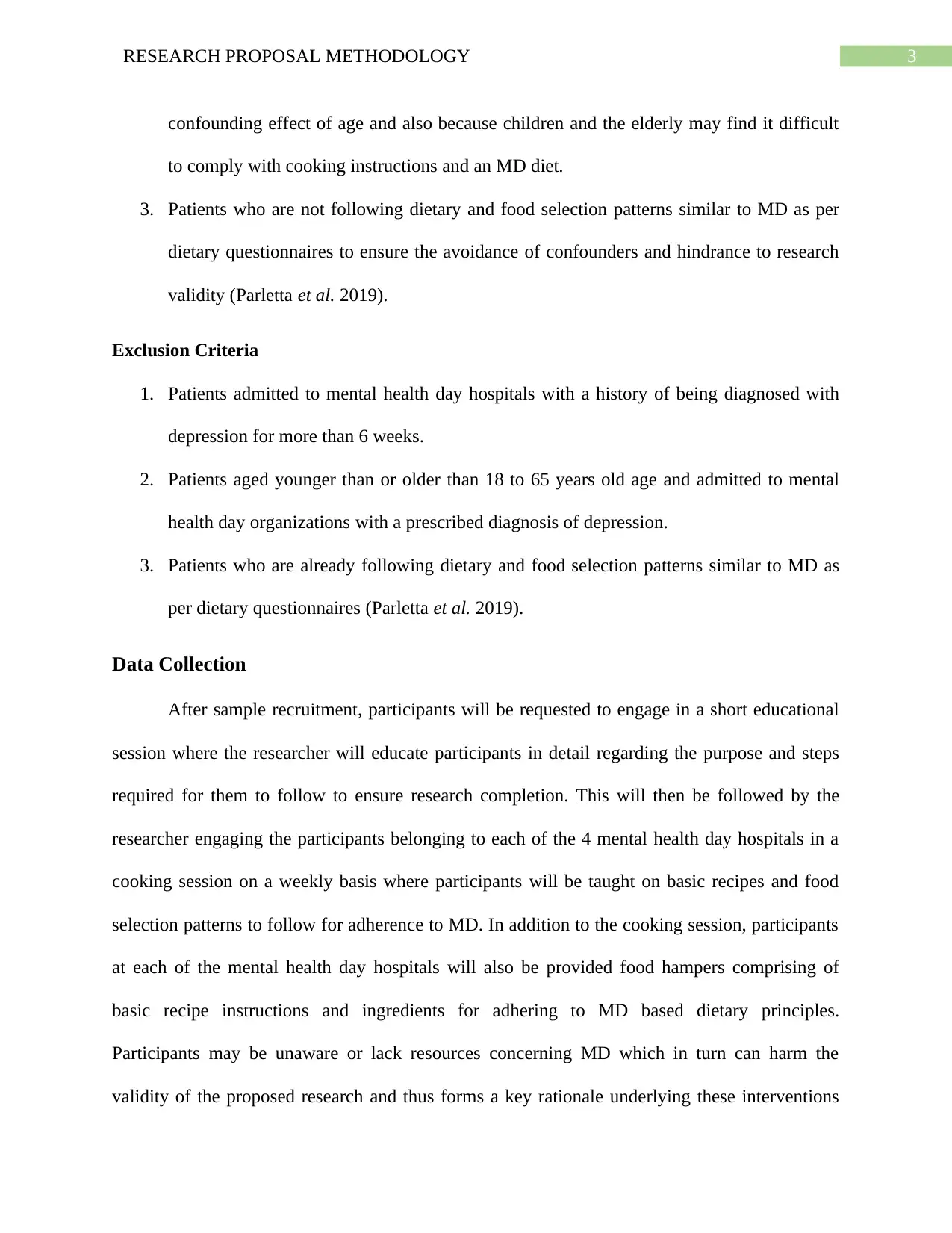
3RESEARCH PROPOSAL METHODOLOGY
confounding effect of age and also because children and the elderly may find it difficult
to comply with cooking instructions and an MD diet.
3. Patients who are not following dietary and food selection patterns similar to MD as per
dietary questionnaires to ensure the avoidance of confounders and hindrance to research
validity (Parletta et al. 2019).
Exclusion Criteria
1. Patients admitted to mental health day hospitals with a history of being diagnosed with
depression for more than 6 weeks.
2. Patients aged younger than or older than 18 to 65 years old age and admitted to mental
health day organizations with a prescribed diagnosis of depression.
3. Patients who are already following dietary and food selection patterns similar to MD as
per dietary questionnaires (Parletta et al. 2019).
Data Collection
After sample recruitment, participants will be requested to engage in a short educational
session where the researcher will educate participants in detail regarding the purpose and steps
required for them to follow to ensure research completion. This will then be followed by the
researcher engaging the participants belonging to each of the 4 mental health day hospitals in a
cooking session on a weekly basis where participants will be taught on basic recipes and food
selection patterns to follow for adherence to MD. In addition to the cooking session, participants
at each of the mental health day hospitals will also be provided food hampers comprising of
basic recipe instructions and ingredients for adhering to MD based dietary principles.
Participants may be unaware or lack resources concerning MD which in turn can harm the
validity of the proposed research and thus forms a key rationale underlying these interventions
confounding effect of age and also because children and the elderly may find it difficult
to comply with cooking instructions and an MD diet.
3. Patients who are not following dietary and food selection patterns similar to MD as per
dietary questionnaires to ensure the avoidance of confounders and hindrance to research
validity (Parletta et al. 2019).
Exclusion Criteria
1. Patients admitted to mental health day hospitals with a history of being diagnosed with
depression for more than 6 weeks.
2. Patients aged younger than or older than 18 to 65 years old age and admitted to mental
health day organizations with a prescribed diagnosis of depression.
3. Patients who are already following dietary and food selection patterns similar to MD as
per dietary questionnaires (Parletta et al. 2019).
Data Collection
After sample recruitment, participants will be requested to engage in a short educational
session where the researcher will educate participants in detail regarding the purpose and steps
required for them to follow to ensure research completion. This will then be followed by the
researcher engaging the participants belonging to each of the 4 mental health day hospitals in a
cooking session on a weekly basis where participants will be taught on basic recipes and food
selection patterns to follow for adherence to MD. In addition to the cooking session, participants
at each of the mental health day hospitals will also be provided food hampers comprising of
basic recipe instructions and ingredients for adhering to MD based dietary principles.
Participants may be unaware or lack resources concerning MD which in turn can harm the
validity of the proposed research and thus forms a key rationale underlying these interventions
Paraphrase This Document
Need a fresh take? Get an instant paraphrase of this document with our AI Paraphraser
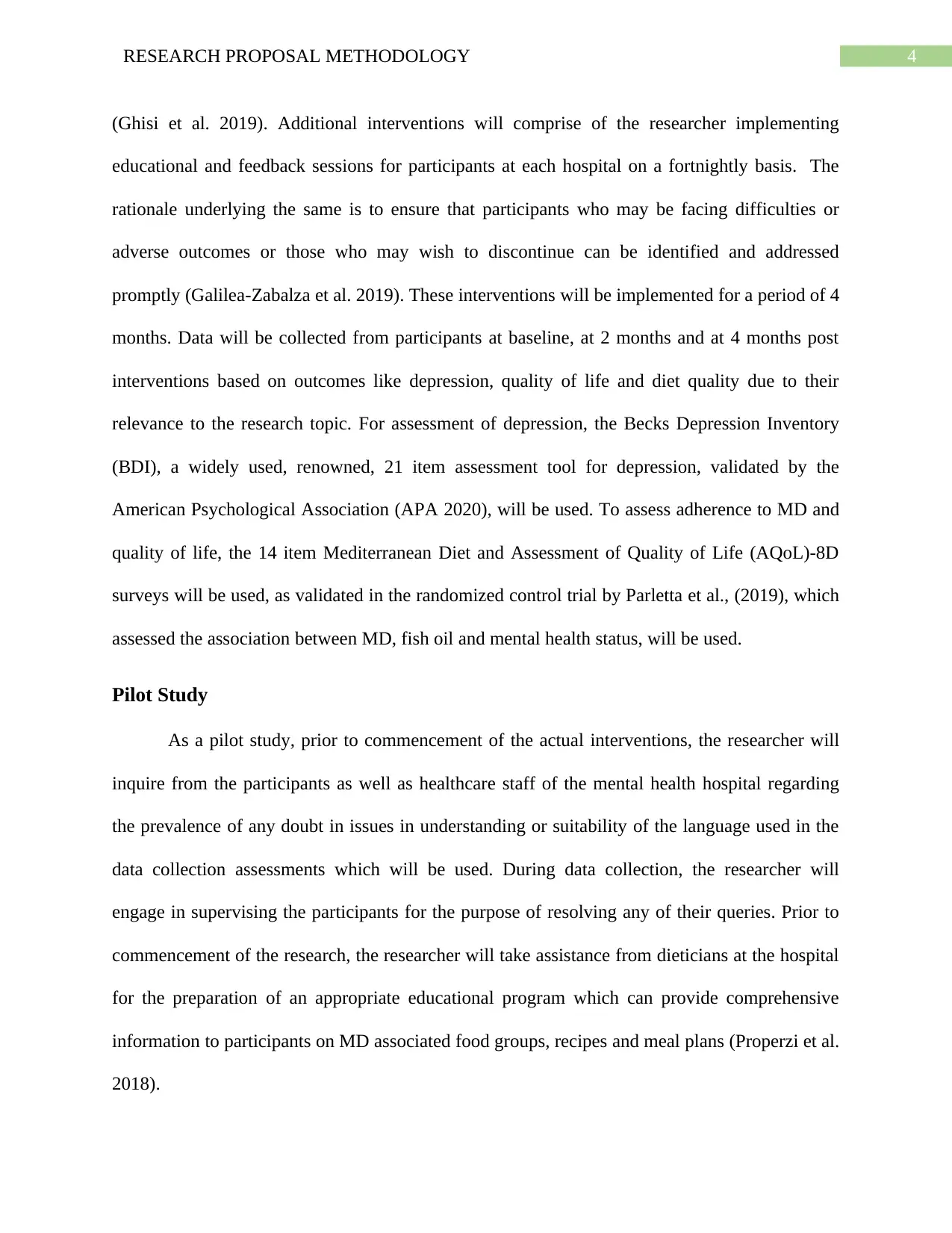
4RESEARCH PROPOSAL METHODOLOGY
(Ghisi et al. 2019). Additional interventions will comprise of the researcher implementing
educational and feedback sessions for participants at each hospital on a fortnightly basis. The
rationale underlying the same is to ensure that participants who may be facing difficulties or
adverse outcomes or those who may wish to discontinue can be identified and addressed
promptly (Galilea-Zabalza et al. 2019). These interventions will be implemented for a period of 4
months. Data will be collected from participants at baseline, at 2 months and at 4 months post
interventions based on outcomes like depression, quality of life and diet quality due to their
relevance to the research topic. For assessment of depression, the Becks Depression Inventory
(BDI), a widely used, renowned, 21 item assessment tool for depression, validated by the
American Psychological Association (APA 2020), will be used. To assess adherence to MD and
quality of life, the 14 item Mediterranean Diet and Assessment of Quality of Life (AQoL)-8D
surveys will be used, as validated in the randomized control trial by Parletta et al., (2019), which
assessed the association between MD, fish oil and mental health status, will be used.
Pilot Study
As a pilot study, prior to commencement of the actual interventions, the researcher will
inquire from the participants as well as healthcare staff of the mental health hospital regarding
the prevalence of any doubt in issues in understanding or suitability of the language used in the
data collection assessments which will be used. During data collection, the researcher will
engage in supervising the participants for the purpose of resolving any of their queries. Prior to
commencement of the research, the researcher will take assistance from dieticians at the hospital
for the preparation of an appropriate educational program which can provide comprehensive
information to participants on MD associated food groups, recipes and meal plans (Properzi et al.
2018).
(Ghisi et al. 2019). Additional interventions will comprise of the researcher implementing
educational and feedback sessions for participants at each hospital on a fortnightly basis. The
rationale underlying the same is to ensure that participants who may be facing difficulties or
adverse outcomes or those who may wish to discontinue can be identified and addressed
promptly (Galilea-Zabalza et al. 2019). These interventions will be implemented for a period of 4
months. Data will be collected from participants at baseline, at 2 months and at 4 months post
interventions based on outcomes like depression, quality of life and diet quality due to their
relevance to the research topic. For assessment of depression, the Becks Depression Inventory
(BDI), a widely used, renowned, 21 item assessment tool for depression, validated by the
American Psychological Association (APA 2020), will be used. To assess adherence to MD and
quality of life, the 14 item Mediterranean Diet and Assessment of Quality of Life (AQoL)-8D
surveys will be used, as validated in the randomized control trial by Parletta et al., (2019), which
assessed the association between MD, fish oil and mental health status, will be used.
Pilot Study
As a pilot study, prior to commencement of the actual interventions, the researcher will
inquire from the participants as well as healthcare staff of the mental health hospital regarding
the prevalence of any doubt in issues in understanding or suitability of the language used in the
data collection assessments which will be used. During data collection, the researcher will
engage in supervising the participants for the purpose of resolving any of their queries. Prior to
commencement of the research, the researcher will take assistance from dieticians at the hospital
for the preparation of an appropriate educational program which can provide comprehensive
information to participants on MD associated food groups, recipes and meal plans (Properzi et al.
2018).
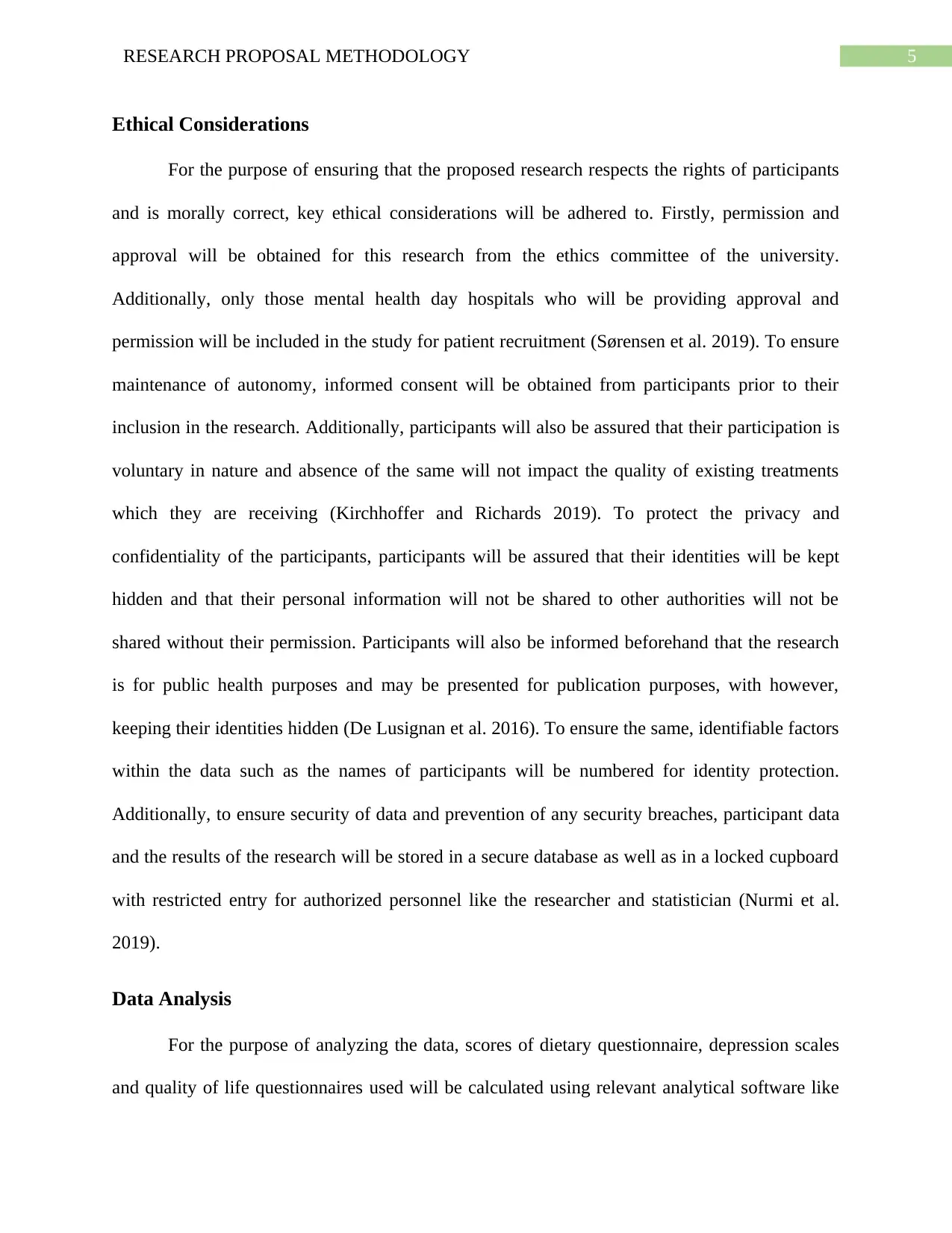
5RESEARCH PROPOSAL METHODOLOGY
Ethical Considerations
For the purpose of ensuring that the proposed research respects the rights of participants
and is morally correct, key ethical considerations will be adhered to. Firstly, permission and
approval will be obtained for this research from the ethics committee of the university.
Additionally, only those mental health day hospitals who will be providing approval and
permission will be included in the study for patient recruitment (Sørensen et al. 2019). To ensure
maintenance of autonomy, informed consent will be obtained from participants prior to their
inclusion in the research. Additionally, participants will also be assured that their participation is
voluntary in nature and absence of the same will not impact the quality of existing treatments
which they are receiving (Kirchhoffer and Richards 2019). To protect the privacy and
confidentiality of the participants, participants will be assured that their identities will be kept
hidden and that their personal information will not be shared to other authorities will not be
shared without their permission. Participants will also be informed beforehand that the research
is for public health purposes and may be presented for publication purposes, with however,
keeping their identities hidden (De Lusignan et al. 2016). To ensure the same, identifiable factors
within the data such as the names of participants will be numbered for identity protection.
Additionally, to ensure security of data and prevention of any security breaches, participant data
and the results of the research will be stored in a secure database as well as in a locked cupboard
with restricted entry for authorized personnel like the researcher and statistician (Nurmi et al.
2019).
Data Analysis
For the purpose of analyzing the data, scores of dietary questionnaire, depression scales
and quality of life questionnaires used will be calculated using relevant analytical software like
Ethical Considerations
For the purpose of ensuring that the proposed research respects the rights of participants
and is morally correct, key ethical considerations will be adhered to. Firstly, permission and
approval will be obtained for this research from the ethics committee of the university.
Additionally, only those mental health day hospitals who will be providing approval and
permission will be included in the study for patient recruitment (Sørensen et al. 2019). To ensure
maintenance of autonomy, informed consent will be obtained from participants prior to their
inclusion in the research. Additionally, participants will also be assured that their participation is
voluntary in nature and absence of the same will not impact the quality of existing treatments
which they are receiving (Kirchhoffer and Richards 2019). To protect the privacy and
confidentiality of the participants, participants will be assured that their identities will be kept
hidden and that their personal information will not be shared to other authorities will not be
shared without their permission. Participants will also be informed beforehand that the research
is for public health purposes and may be presented for publication purposes, with however,
keeping their identities hidden (De Lusignan et al. 2016). To ensure the same, identifiable factors
within the data such as the names of participants will be numbered for identity protection.
Additionally, to ensure security of data and prevention of any security breaches, participant data
and the results of the research will be stored in a secure database as well as in a locked cupboard
with restricted entry for authorized personnel like the researcher and statistician (Nurmi et al.
2019).
Data Analysis
For the purpose of analyzing the data, scores of dietary questionnaire, depression scales
and quality of life questionnaires used will be calculated using relevant analytical software like
⊘ This is a preview!⊘
Do you want full access?
Subscribe today to unlock all pages.

Trusted by 1+ million students worldwide
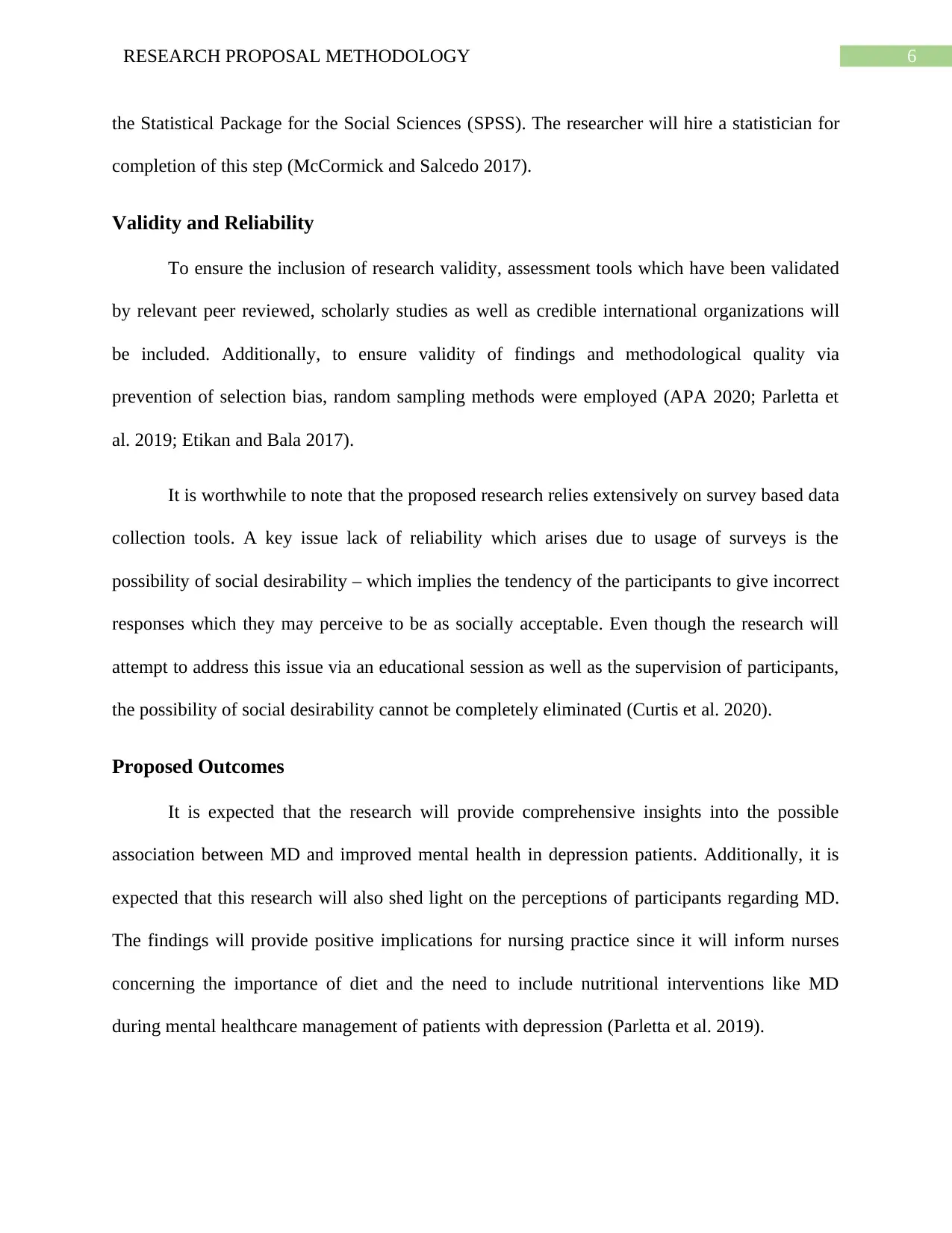
6RESEARCH PROPOSAL METHODOLOGY
the Statistical Package for the Social Sciences (SPSS). The researcher will hire a statistician for
completion of this step (McCormick and Salcedo 2017).
Validity and Reliability
To ensure the inclusion of research validity, assessment tools which have been validated
by relevant peer reviewed, scholarly studies as well as credible international organizations will
be included. Additionally, to ensure validity of findings and methodological quality via
prevention of selection bias, random sampling methods were employed (APA 2020; Parletta et
al. 2019; Etikan and Bala 2017).
It is worthwhile to note that the proposed research relies extensively on survey based data
collection tools. A key issue lack of reliability which arises due to usage of surveys is the
possibility of social desirability – which implies the tendency of the participants to give incorrect
responses which they may perceive to be as socially acceptable. Even though the research will
attempt to address this issue via an educational session as well as the supervision of participants,
the possibility of social desirability cannot be completely eliminated (Curtis et al. 2020).
Proposed Outcomes
It is expected that the research will provide comprehensive insights into the possible
association between MD and improved mental health in depression patients. Additionally, it is
expected that this research will also shed light on the perceptions of participants regarding MD.
The findings will provide positive implications for nursing practice since it will inform nurses
concerning the importance of diet and the need to include nutritional interventions like MD
during mental healthcare management of patients with depression (Parletta et al. 2019).
the Statistical Package for the Social Sciences (SPSS). The researcher will hire a statistician for
completion of this step (McCormick and Salcedo 2017).
Validity and Reliability
To ensure the inclusion of research validity, assessment tools which have been validated
by relevant peer reviewed, scholarly studies as well as credible international organizations will
be included. Additionally, to ensure validity of findings and methodological quality via
prevention of selection bias, random sampling methods were employed (APA 2020; Parletta et
al. 2019; Etikan and Bala 2017).
It is worthwhile to note that the proposed research relies extensively on survey based data
collection tools. A key issue lack of reliability which arises due to usage of surveys is the
possibility of social desirability – which implies the tendency of the participants to give incorrect
responses which they may perceive to be as socially acceptable. Even though the research will
attempt to address this issue via an educational session as well as the supervision of participants,
the possibility of social desirability cannot be completely eliminated (Curtis et al. 2020).
Proposed Outcomes
It is expected that the research will provide comprehensive insights into the possible
association between MD and improved mental health in depression patients. Additionally, it is
expected that this research will also shed light on the perceptions of participants regarding MD.
The findings will provide positive implications for nursing practice since it will inform nurses
concerning the importance of diet and the need to include nutritional interventions like MD
during mental healthcare management of patients with depression (Parletta et al. 2019).
Paraphrase This Document
Need a fresh take? Get an instant paraphrase of this document with our AI Paraphraser
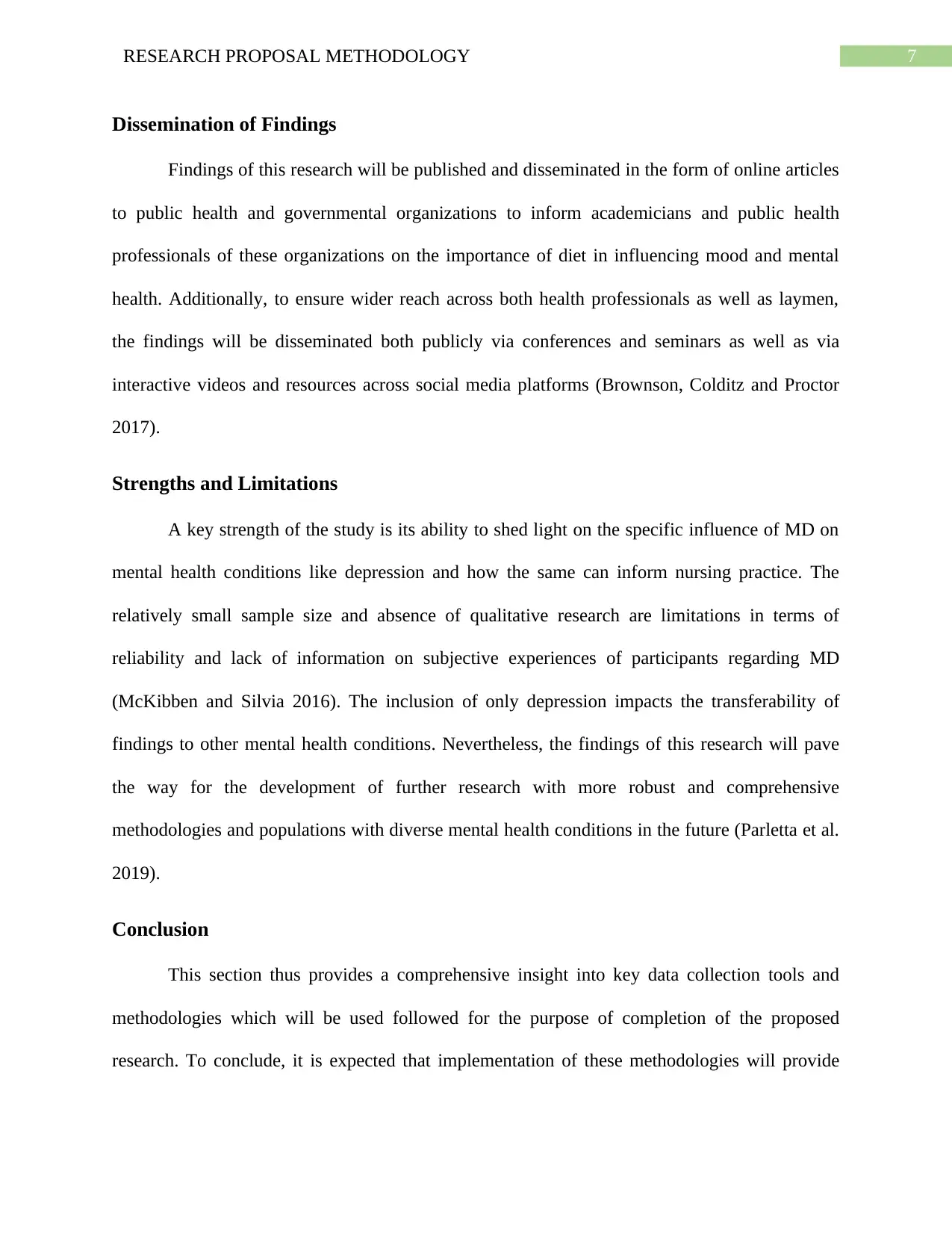
7RESEARCH PROPOSAL METHODOLOGY
Dissemination of Findings
Findings of this research will be published and disseminated in the form of online articles
to public health and governmental organizations to inform academicians and public health
professionals of these organizations on the importance of diet in influencing mood and mental
health. Additionally, to ensure wider reach across both health professionals as well as laymen,
the findings will be disseminated both publicly via conferences and seminars as well as via
interactive videos and resources across social media platforms (Brownson, Colditz and Proctor
2017).
Strengths and Limitations
A key strength of the study is its ability to shed light on the specific influence of MD on
mental health conditions like depression and how the same can inform nursing practice. The
relatively small sample size and absence of qualitative research are limitations in terms of
reliability and lack of information on subjective experiences of participants regarding MD
(McKibben and Silvia 2016). The inclusion of only depression impacts the transferability of
findings to other mental health conditions. Nevertheless, the findings of this research will pave
the way for the development of further research with more robust and comprehensive
methodologies and populations with diverse mental health conditions in the future (Parletta et al.
2019).
Conclusion
This section thus provides a comprehensive insight into key data collection tools and
methodologies which will be used followed for the purpose of completion of the proposed
research. To conclude, it is expected that implementation of these methodologies will provide
Dissemination of Findings
Findings of this research will be published and disseminated in the form of online articles
to public health and governmental organizations to inform academicians and public health
professionals of these organizations on the importance of diet in influencing mood and mental
health. Additionally, to ensure wider reach across both health professionals as well as laymen,
the findings will be disseminated both publicly via conferences and seminars as well as via
interactive videos and resources across social media platforms (Brownson, Colditz and Proctor
2017).
Strengths and Limitations
A key strength of the study is its ability to shed light on the specific influence of MD on
mental health conditions like depression and how the same can inform nursing practice. The
relatively small sample size and absence of qualitative research are limitations in terms of
reliability and lack of information on subjective experiences of participants regarding MD
(McKibben and Silvia 2016). The inclusion of only depression impacts the transferability of
findings to other mental health conditions. Nevertheless, the findings of this research will pave
the way for the development of further research with more robust and comprehensive
methodologies and populations with diverse mental health conditions in the future (Parletta et al.
2019).
Conclusion
This section thus provides a comprehensive insight into key data collection tools and
methodologies which will be used followed for the purpose of completion of the proposed
research. To conclude, it is expected that implementation of these methodologies will provide
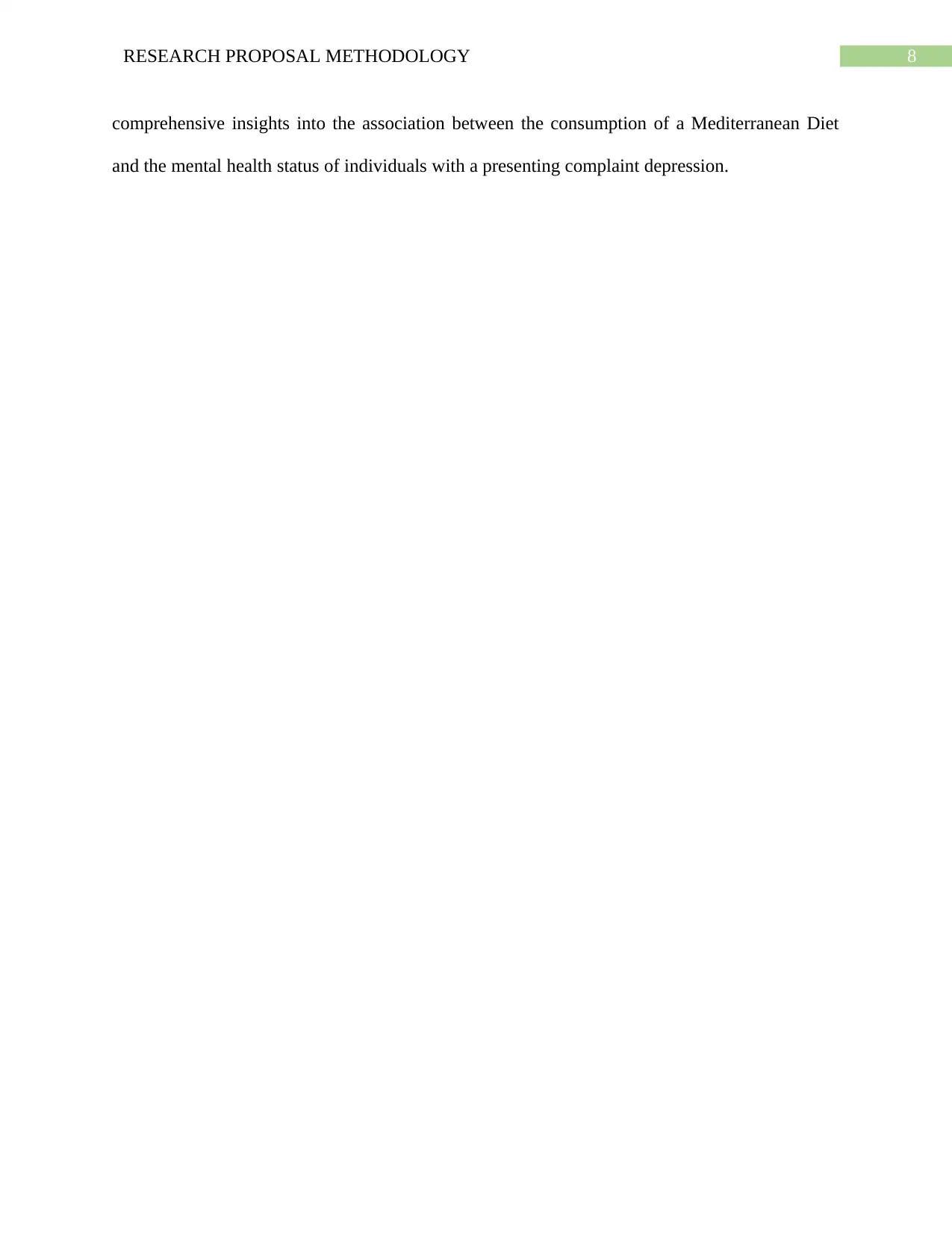
8RESEARCH PROPOSAL METHODOLOGY
comprehensive insights into the association between the consumption of a Mediterranean Diet
and the mental health status of individuals with a presenting complaint depression.
comprehensive insights into the association between the consumption of a Mediterranean Diet
and the mental health status of individuals with a presenting complaint depression.
⊘ This is a preview!⊘
Do you want full access?
Subscribe today to unlock all pages.

Trusted by 1+ million students worldwide
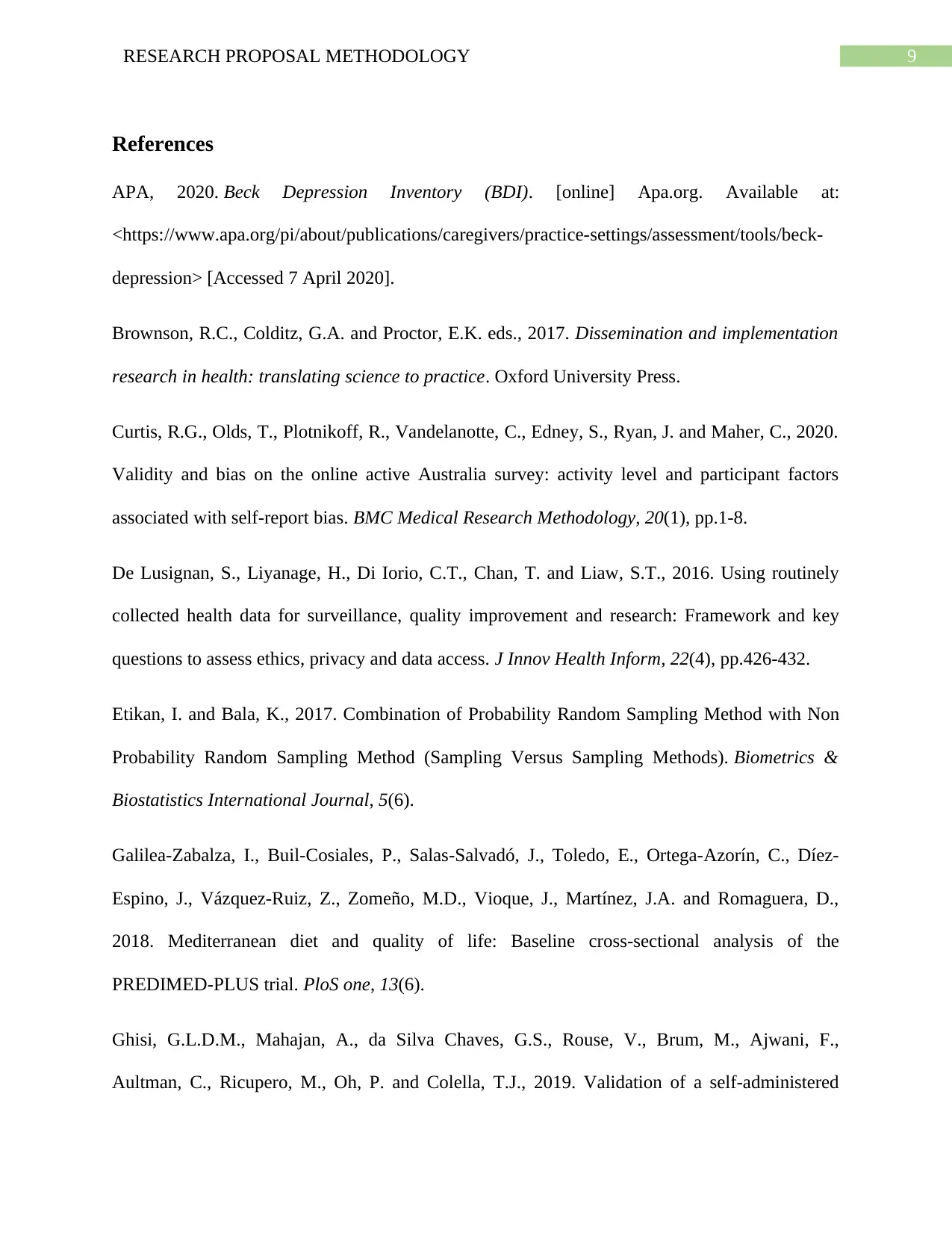
9RESEARCH PROPOSAL METHODOLOGY
References
APA, 2020. Beck Depression Inventory (BDI). [online] Apa.org. Available at:
<https://www.apa.org/pi/about/publications/caregivers/practice-settings/assessment/tools/beck-
depression> [Accessed 7 April 2020].
Brownson, R.C., Colditz, G.A. and Proctor, E.K. eds., 2017. Dissemination and implementation
research in health: translating science to practice. Oxford University Press.
Curtis, R.G., Olds, T., Plotnikoff, R., Vandelanotte, C., Edney, S., Ryan, J. and Maher, C., 2020.
Validity and bias on the online active Australia survey: activity level and participant factors
associated with self-report bias. BMC Medical Research Methodology, 20(1), pp.1-8.
De Lusignan, S., Liyanage, H., Di Iorio, C.T., Chan, T. and Liaw, S.T., 2016. Using routinely
collected health data for surveillance, quality improvement and research: Framework and key
questions to assess ethics, privacy and data access. J Innov Health Inform, 22(4), pp.426-432.
Etikan, I. and Bala, K., 2017. Combination of Probability Random Sampling Method with Non
Probability Random Sampling Method (Sampling Versus Sampling Methods). Biometrics &
Biostatistics International Journal, 5(6).
Galilea-Zabalza, I., Buil-Cosiales, P., Salas-Salvadó, J., Toledo, E., Ortega-Azorín, C., Díez-
Espino, J., Vázquez-Ruiz, Z., Zomeño, M.D., Vioque, J., Martínez, J.A. and Romaguera, D.,
2018. Mediterranean diet and quality of life: Baseline cross-sectional analysis of the
PREDIMED-PLUS trial. PloS one, 13(6).
Ghisi, G.L.D.M., Mahajan, A., da Silva Chaves, G.S., Rouse, V., Brum, M., Ajwani, F.,
Aultman, C., Ricupero, M., Oh, P. and Colella, T.J., 2019. Validation of a self-administered
References
APA, 2020. Beck Depression Inventory (BDI). [online] Apa.org. Available at:
<https://www.apa.org/pi/about/publications/caregivers/practice-settings/assessment/tools/beck-
depression> [Accessed 7 April 2020].
Brownson, R.C., Colditz, G.A. and Proctor, E.K. eds., 2017. Dissemination and implementation
research in health: translating science to practice. Oxford University Press.
Curtis, R.G., Olds, T., Plotnikoff, R., Vandelanotte, C., Edney, S., Ryan, J. and Maher, C., 2020.
Validity and bias on the online active Australia survey: activity level and participant factors
associated with self-report bias. BMC Medical Research Methodology, 20(1), pp.1-8.
De Lusignan, S., Liyanage, H., Di Iorio, C.T., Chan, T. and Liaw, S.T., 2016. Using routinely
collected health data for surveillance, quality improvement and research: Framework and key
questions to assess ethics, privacy and data access. J Innov Health Inform, 22(4), pp.426-432.
Etikan, I. and Bala, K., 2017. Combination of Probability Random Sampling Method with Non
Probability Random Sampling Method (Sampling Versus Sampling Methods). Biometrics &
Biostatistics International Journal, 5(6).
Galilea-Zabalza, I., Buil-Cosiales, P., Salas-Salvadó, J., Toledo, E., Ortega-Azorín, C., Díez-
Espino, J., Vázquez-Ruiz, Z., Zomeño, M.D., Vioque, J., Martínez, J.A. and Romaguera, D.,
2018. Mediterranean diet and quality of life: Baseline cross-sectional analysis of the
PREDIMED-PLUS trial. PloS one, 13(6).
Ghisi, G.L.D.M., Mahajan, A., da Silva Chaves, G.S., Rouse, V., Brum, M., Ajwani, F.,
Aultman, C., Ricupero, M., Oh, P. and Colella, T.J., 2019. Validation of a self-administered
Paraphrase This Document
Need a fresh take? Get an instant paraphrase of this document with our AI Paraphraser
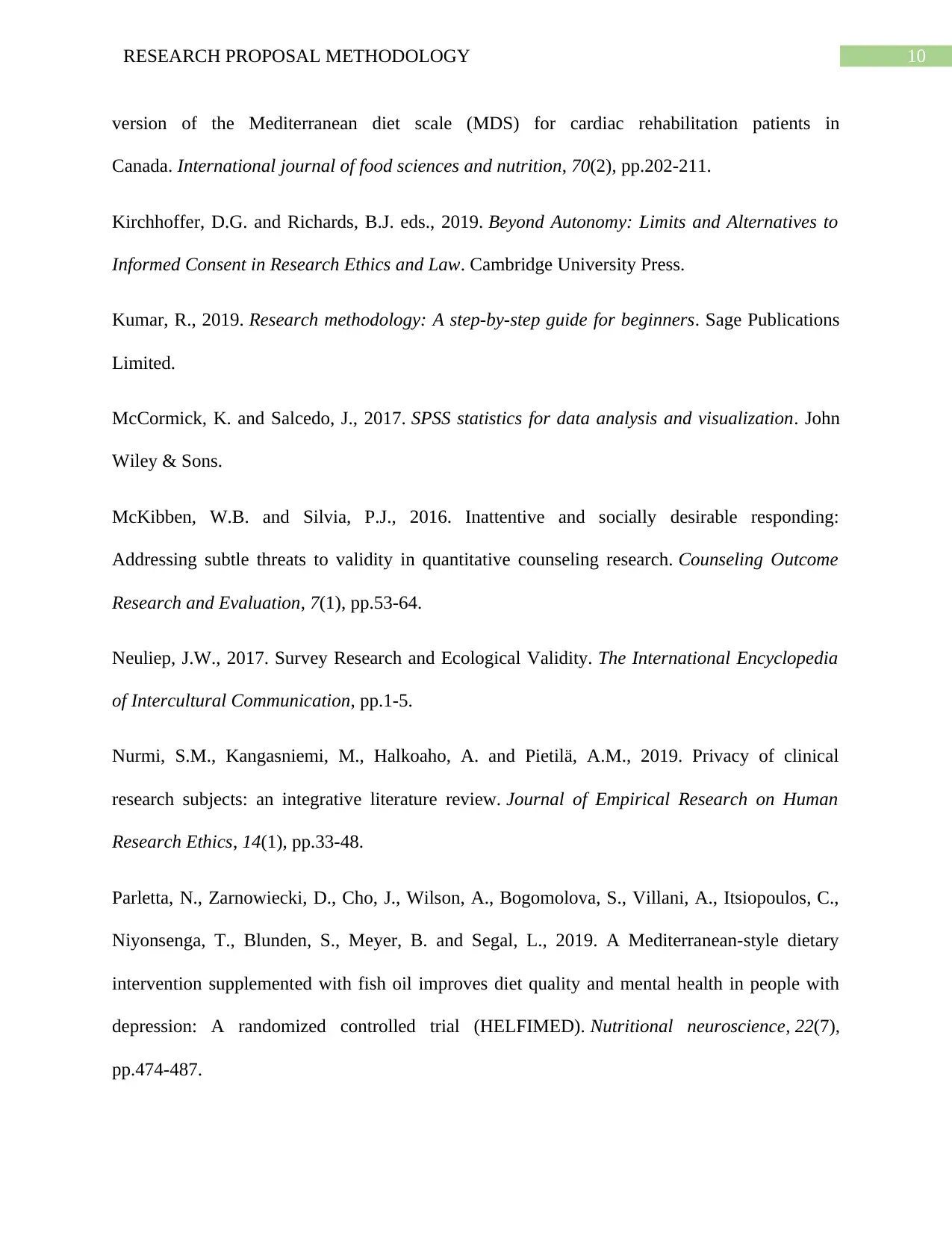
10RESEARCH PROPOSAL METHODOLOGY
version of the Mediterranean diet scale (MDS) for cardiac rehabilitation patients in
Canada. International journal of food sciences and nutrition, 70(2), pp.202-211.
Kirchhoffer, D.G. and Richards, B.J. eds., 2019. Beyond Autonomy: Limits and Alternatives to
Informed Consent in Research Ethics and Law. Cambridge University Press.
Kumar, R., 2019. Research methodology: A step-by-step guide for beginners. Sage Publications
Limited.
McCormick, K. and Salcedo, J., 2017. SPSS statistics for data analysis and visualization. John
Wiley & Sons.
McKibben, W.B. and Silvia, P.J., 2016. Inattentive and socially desirable responding:
Addressing subtle threats to validity in quantitative counseling research. Counseling Outcome
Research and Evaluation, 7(1), pp.53-64.
Neuliep, J.W., 2017. Survey Research and Ecological Validity. The International Encyclopedia
of Intercultural Communication, pp.1-5.
Nurmi, S.M., Kangasniemi, M., Halkoaho, A. and Pietilä, A.M., 2019. Privacy of clinical
research subjects: an integrative literature review. Journal of Empirical Research on Human
Research Ethics, 14(1), pp.33-48.
Parletta, N., Zarnowiecki, D., Cho, J., Wilson, A., Bogomolova, S., Villani, A., Itsiopoulos, C.,
Niyonsenga, T., Blunden, S., Meyer, B. and Segal, L., 2019. A Mediterranean-style dietary
intervention supplemented with fish oil improves diet quality and mental health in people with
depression: A randomized controlled trial (HELFIMED). Nutritional neuroscience, 22(7),
pp.474-487.
version of the Mediterranean diet scale (MDS) for cardiac rehabilitation patients in
Canada. International journal of food sciences and nutrition, 70(2), pp.202-211.
Kirchhoffer, D.G. and Richards, B.J. eds., 2019. Beyond Autonomy: Limits and Alternatives to
Informed Consent in Research Ethics and Law. Cambridge University Press.
Kumar, R., 2019. Research methodology: A step-by-step guide for beginners. Sage Publications
Limited.
McCormick, K. and Salcedo, J., 2017. SPSS statistics for data analysis and visualization. John
Wiley & Sons.
McKibben, W.B. and Silvia, P.J., 2016. Inattentive and socially desirable responding:
Addressing subtle threats to validity in quantitative counseling research. Counseling Outcome
Research and Evaluation, 7(1), pp.53-64.
Neuliep, J.W., 2017. Survey Research and Ecological Validity. The International Encyclopedia
of Intercultural Communication, pp.1-5.
Nurmi, S.M., Kangasniemi, M., Halkoaho, A. and Pietilä, A.M., 2019. Privacy of clinical
research subjects: an integrative literature review. Journal of Empirical Research on Human
Research Ethics, 14(1), pp.33-48.
Parletta, N., Zarnowiecki, D., Cho, J., Wilson, A., Bogomolova, S., Villani, A., Itsiopoulos, C.,
Niyonsenga, T., Blunden, S., Meyer, B. and Segal, L., 2019. A Mediterranean-style dietary
intervention supplemented with fish oil improves diet quality and mental health in people with
depression: A randomized controlled trial (HELFIMED). Nutritional neuroscience, 22(7),
pp.474-487.
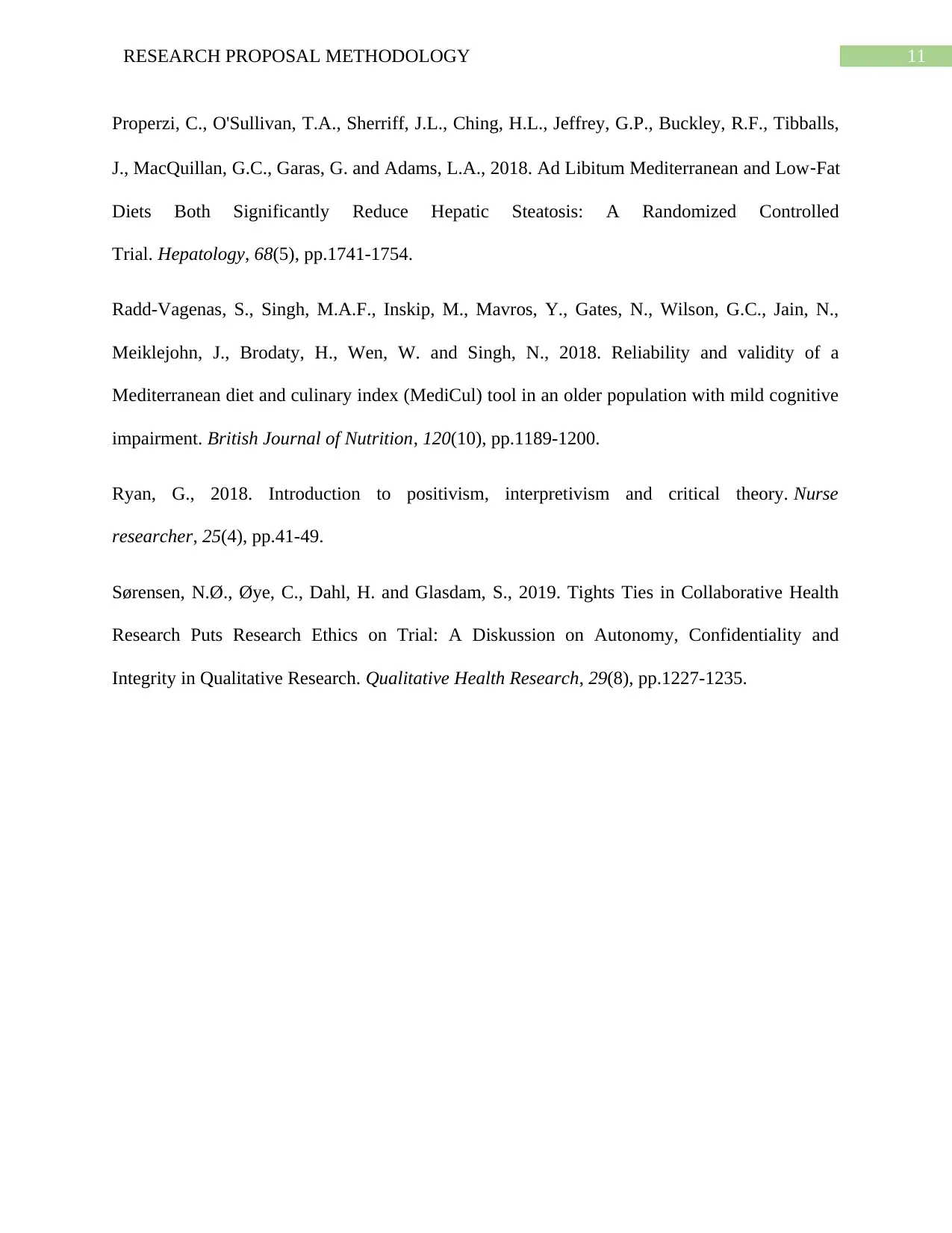
11RESEARCH PROPOSAL METHODOLOGY
Properzi, C., O'Sullivan, T.A., Sherriff, J.L., Ching, H.L., Jeffrey, G.P., Buckley, R.F., Tibballs,
J., MacQuillan, G.C., Garas, G. and Adams, L.A., 2018. Ad Libitum Mediterranean and Low‐Fat
Diets Both Significantly Reduce Hepatic Steatosis: A Randomized Controlled
Trial. Hepatology, 68(5), pp.1741-1754.
Radd-Vagenas, S., Singh, M.A.F., Inskip, M., Mavros, Y., Gates, N., Wilson, G.C., Jain, N.,
Meiklejohn, J., Brodaty, H., Wen, W. and Singh, N., 2018. Reliability and validity of a
Mediterranean diet and culinary index (MediCul) tool in an older population with mild cognitive
impairment. British Journal of Nutrition, 120(10), pp.1189-1200.
Ryan, G., 2018. Introduction to positivism, interpretivism and critical theory. Nurse
researcher, 25(4), pp.41-49.
Sørensen, N.Ø., Øye, C., Dahl, H. and Glasdam, S., 2019. Tights Ties in Collaborative Health
Research Puts Research Ethics on Trial: A Diskussion on Autonomy, Confidentiality and
Integrity in Qualitative Research. Qualitative Health Research, 29(8), pp.1227-1235.
Properzi, C., O'Sullivan, T.A., Sherriff, J.L., Ching, H.L., Jeffrey, G.P., Buckley, R.F., Tibballs,
J., MacQuillan, G.C., Garas, G. and Adams, L.A., 2018. Ad Libitum Mediterranean and Low‐Fat
Diets Both Significantly Reduce Hepatic Steatosis: A Randomized Controlled
Trial. Hepatology, 68(5), pp.1741-1754.
Radd-Vagenas, S., Singh, M.A.F., Inskip, M., Mavros, Y., Gates, N., Wilson, G.C., Jain, N.,
Meiklejohn, J., Brodaty, H., Wen, W. and Singh, N., 2018. Reliability and validity of a
Mediterranean diet and culinary index (MediCul) tool in an older population with mild cognitive
impairment. British Journal of Nutrition, 120(10), pp.1189-1200.
Ryan, G., 2018. Introduction to positivism, interpretivism and critical theory. Nurse
researcher, 25(4), pp.41-49.
Sørensen, N.Ø., Øye, C., Dahl, H. and Glasdam, S., 2019. Tights Ties in Collaborative Health
Research Puts Research Ethics on Trial: A Diskussion on Autonomy, Confidentiality and
Integrity in Qualitative Research. Qualitative Health Research, 29(8), pp.1227-1235.
⊘ This is a preview!⊘
Do you want full access?
Subscribe today to unlock all pages.

Trusted by 1+ million students worldwide
1 out of 12
Related Documents
Your All-in-One AI-Powered Toolkit for Academic Success.
+13062052269
info@desklib.com
Available 24*7 on WhatsApp / Email
![[object Object]](/_next/static/media/star-bottom.7253800d.svg)
Unlock your academic potential
Copyright © 2020–2026 A2Z Services. All Rights Reserved. Developed and managed by ZUCOL.




